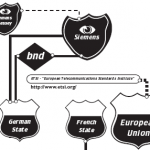 The European Commission and the Government of the United States have agreed to enhance cooperation in science and technology research to improve the shared capabilities to protect against acts of terrorism and other threats to domestic and external security. Subsequent to the EU-US Vienna Summit Conclusions of June 2006, there was mutual understanding that greater transparency is needed between the security programmes of the two parties. The Implementing Arrangement for Cooperative Activities in the Field of Homeland/Civil Security Research, signed on 18th November 2010, constitutes a formal basis for cooperation in scientific and technological research. It extends and strengthens cooperative activities in areas of common interest and encourages the application of the results of such cooperation to the economic and social benefit of the parties. The Implementing Arrangement is pursuant to the overarching Agreement for Scientific and Technical Cooperation between the Government of the United States and the European Commission, as extended and expanded to include security research in July 2009.
The European Commission and the Government of the United States have agreed to enhance cooperation in science and technology research to improve the shared capabilities to protect against acts of terrorism and other threats to domestic and external security. Subsequent to the EU-US Vienna Summit Conclusions of June 2006, there was mutual understanding that greater transparency is needed between the security programmes of the two parties. The Implementing Arrangement for Cooperative Activities in the Field of Homeland/Civil Security Research, signed on 18th November 2010, constitutes a formal basis for cooperation in scientific and technological research. It extends and strengthens cooperative activities in areas of common interest and encourages the application of the results of such cooperation to the economic and social benefit of the parties. The Implementing Arrangement is pursuant to the overarching Agreement for Scientific and Technical Cooperation between the Government of the United States and the European Commission, as extended and expanded to include security research in July 2009.
Why does it need to be done?
The Implementing Arrangement is an important step in the area of security research as security issues are becoming increasingly global. Understanding each other’s security research programmes will benefit both parties and contribute tot the development of the programmes. The main aims are to encourage, develop and facilitate cooperative activities in the field of homeland and civil security research between European Commission and United States of America, conducted on the basis of mutual benefit gained from an overall balance of advantages, reciprocal opportunities to engage in cooperative activities and equitable and fair treatment. Importantly, it does not create obligations binding under law.
EU/US cooperation projects
The Implementing Arrangement calls for close cooperation between the US and the European Union on Security of citizens from both natural and man-made threats, including the management of crisis and emergency situations; security and resilience of critical infrastructures; interaction of security and society, including the human-technology interface, behavioral research, privacy concerns, and biometrics; security of border controls and crossings, including land and coastal borders; optimization of existing technologies, and their inter-operability; development of end-user technologies and equipment such as those for civil protection and first responders; and development and exchange of relevant requirements, standards, vulnerability assessments, interdependency analyses, certifications, best practices, guidelines, training programs, test reports, data, software, equipment, and personnel.
The Implementing Arrangement draws on the collective technical expertise of scientists from the US and throughout the European Union, including a robust network of international research centers in the European Union and United States of America and encourages robust participation by universities, non-profit organizations, and the private sector through public-private partnerships and collaborative funding opportunities. In order to cooperate efficiently, there will two appointed representatives one from each side, which will be known as the ‚Steering Group.‘ The group will coordinate the general activities and evaluation of the implementation agreement, further they will meet once annually.
Possible future reference and conclusion
Through this cooperation resources, knowledge, and skill of both the US and EU will be applied to develop science and technology solutions to shared security challenges. This arrangement will continue to foster cooperation and strengthen the respective research and development activities and policies between the Government of the United States and the European Community. The Implementing Arrangement for Cooperative Activities in the Field of Homeland/Civil Security Research under the Agreement for Scientific and Technical Cooperation between the Government of the United States and the European Community was signed by Secretary Janet Napolitano and European Commission Vice-President Antonio Tajani.
European Commission Security website:
http://ec.europa.eu/enterprise/policies/security/index_en.htm
